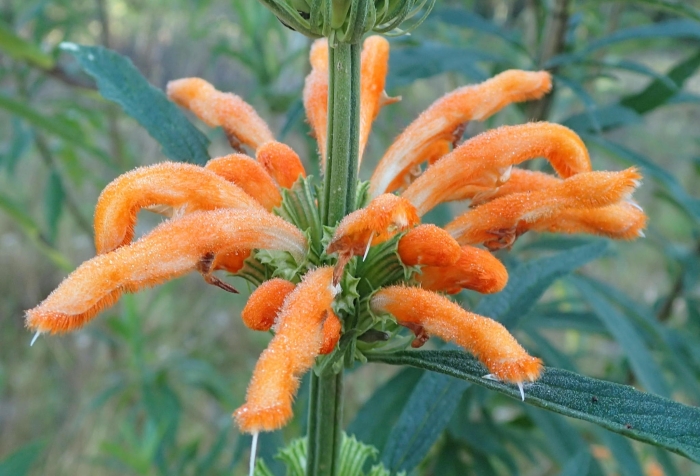Lion’s Tail
(Leonotis leonurus)
Lion’s Tail (Leonotis leonurus)
/
/

Nicola van Berkel
CC BY-SA 4.0
Image By:
Nicola van Berkel
Recorded By:
Copyright:
CC BY-SA 4.0
Copyright Notice:
Photo by: Nicola van Berkel | License Type: CC BY-SA 4.0 | License URL: http://creativecommons.org/licenses/by-sa/4.0/ | Rights Holder: Nicola van Berkel | Publisher: iNaturalist | Date Created: 42488 |










































































Estimated Native Range
Summary
Leonotis leonurus, commonly known as Lion’s Tail, is an evergreen shrub native to open woodlands and grassy plains of South Africa. It typically grows 3 to 6 ft (1 to 2 m) tall and 1.5 to 3.5 feet (0.46 to 1.07 m) wide. The shrub has a distinctive appearance with medium-dark green, lance-shaped leaves that are aromatic when crushed and square stems. The bright orange, tubular flowers are arranged in tiered whorls and bloom from summer to winter in warmer climates, attracting pollinators and adding a vibrant display to the garden. Lion’s Tail is valued for its showy flowers, ease of maintenance, and drought tolerance.
Lion’s Tail is used in gardens and parks as an ornamental plant, often serving as an accent or screen. It thrives in full sun and requires medium water, preferring well-drained soils. While it is perennial in its native range, it is often grown as an annual in cooler climates or overwintered in conservatories. The plant can be a nectar source for birds and butterflies, enhancing biodiversity in landscape settings. It is also known for its mild calming effects when the dried leaves and flowers are smoked, though it is less potent than THC. Gardeners should be aware that in some regions, it can become invasive if not managed properly.CC BY-SA 4.0
Lion’s Tail is used in gardens and parks as an ornamental plant, often serving as an accent or screen. It thrives in full sun and requires medium water, preferring well-drained soils. While it is perennial in its native range, it is often grown as an annual in cooler climates or overwintered in conservatories. The plant can be a nectar source for birds and butterflies, enhancing biodiversity in landscape settings. It is also known for its mild calming effects when the dried leaves and flowers are smoked, though it is less potent than THC. Gardeners should be aware that in some regions, it can become invasive if not managed properly.CC BY-SA 4.0
Plant Description
- Plant Type: Shrub
- Height: 3-6 feet
- Width: 1.5-3 feet
- Growth Rate: Rapid
- Flower Color: Orange
- Flowering Season: Spring, Summer, Fall
- Leaf Retention: Evergreen
Growth Requirements
- Sun: Full Sun
- Water: Medium
- Drainage: Medium
Common Uses
Bee Garden, Bird Garden, Border Plant, Butterfly Garden, Deer Resistant, Drought Tolerant, Fire Resistant, Fragrant, Groundcover, Hummingbird Garden, Potted Plant, Rock Garden, Salt Tolerant, Showy Flowers
Natural Habitat
Open woodlands and grassy plains of South Africa
Other Names
Common Names: Wild Dagga
Scientific Names: , Leonotis leonurus, Phlomis leonurus, Leucas leonurus, Hemisodon leonurus, Leonotis africanus, Leonotis leonurus var. albiflora, Leonurus africanus, Leonurus grandiflorus, Leonurus superbus
GBIF Accepted Name: Leonotis leonurus (L.) R.Br.